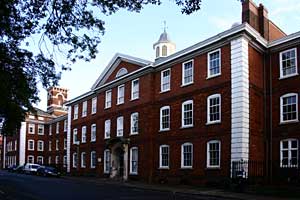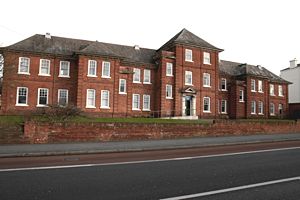
Exeter Stories
Exeter folk and friends in their own words - 1890's to the 1990's │ << Previous story │ Next story >> │
Robin Wills - Doctors, Dentists and Hospitals
I can recall the very first doctor that I had. She was called Dr Heinz (the spelling might be incorrect) and her surgery was at the very top of Radford Road on the left-hand corner with Magdalen Road. She was a middle-aged lady, and I recall that her surgery had large French windows, that opened out onto her garden, and these were normally kept open if the weather allowed.
It was perhaps this relaxed, semi-pastoral setting that has left me with positive, tranquil feelings towards my first brush with the world of medicine. I cannot recall the occasion, but Dr Heinz must have been responsible for arranging for me to have my tonsils out (more of this later) … but I forgive her! I guess she must have long since passed away but she was my only doctor until I left to live and work in London in 1958.
The doctor described above was fairly typical of most doctors at that time and up until the late twentieth century … that is, they usually worked on their own, having their surgery and waiting-room as part of their house, patients arriving without appointments and waiting their turn in the queue. As I am sure, that you the reader know, much has changed as we get well into the twenty-first century, with group practices of up to ten doctors in specially built premises, and waits of up to a week to get non-urgent appointments with one’s own doctor. I think that in spite of some of the benefits of today’s arrangements, I still prefer things as they used to be!
The Dentist
Dentists were an altogether different matter however. My first brush (sorry about the pun) with these purveyors of fear, pain and suffering came when, at school, our teacher informed us that the schools’ dentist was on the premises and that we were to leave our desks and go and line up outside a particular classroom. The fear and trepidation engendered by this was something else, with some pupils trying to sneak off to the toilets or hide elsewhere but all were eventually ‘rounded up’ and even those who were absent on that day did not escape the net either.
This visit was not for treatment, but purely for inspection, and if no treatment was deemed necessary the relief was so tangible that it could be cut with a knife. However, once you heard the dentist say to the nurse some gobbledygook such as, “Clausal …upper-right three”, you knew that your fate was sealed and that a letter home to inform your parents was on its way.
Once an appointment had been made there was no escape and I well remember visiting the schools’ dental centre in Southernhay, which was adjacent to but outside the Bishop’s Palace gardens and opposite Dean Clarke House, which was the old Royal Devon and Exeter Hospital. My father died in that hospital much later in 1966.
Once you were in the dentist’s chair you were forcibly held down whilst the gas mask was clamped over your face. A short period of struggle took place whilst your body fought for its very existence and then recovery after what seemed just a few seconds but was probably several minutes. Later I shall compare this experience with anaesthesia at the Heavitree hospital when I had my tonsils removed.
Just for the record, I later married a dental nurse and through her became acquainted both with her boss, a much gentler dental surgeon, and also the equipment used in his surgery, so I began to lose my fear of dentists and dentistry and view it now as no worse than a trip to the barbers.
Tonsils and adenoids
We now come to my first experience of hospitals. I suppose I was about nine years old when I began to have a succession of sore throats and my mother took me to see Dr Heinz, mentioned earlier. She recommended that I have my tonsils and adenoids out (a routine recommendation in those days … though less so today) and duly went ahead and made the arrangements. I argued that if God had given me tonsils and adenoids (what on earth are they?) then presumably I needed tonsils and adenoids … but my protestations went unheeded.
For my hospital stay, my mother prepared a sponge bag filled with the usual necessities such as toothbrush, toothpaste and face flannel (rarely used by most people today) but the soap is the thing that I remember most. She put in a new bar of Cussons Imperial Leather soap, with its distinctive fresh smell. They say that smells and sounds and even tastes can trigger long-buried memories, and it is certainly true in this case, because every time that I smell that particular soap today, I am immediately whisked back to that hospital ward’s bathroom in 1950.
On the appointed day my mother took me to the Heavitree Hospital. This was opposite and a bit further east of the St Luke’s Training College in Heavitree Rd. It was the weekend and my operation was on the Monday morning. I was placed in a ward with about nine other young boys, all in for the same operation.
As luck would have it, my dad was also in the same hospital in order to have a hernia operation a few days before my operation and the nursing staff had promised him that they would wheel me into his ward on my way back from the operating theatre so that he could have a look at me … which they did!
We young lads were given a talking to on the Sunday. Apart from no breakfast on the following day, we were told about the pre-med injections and advised that one of these was designed to dry up our saliva so the less we talked after these injections, the better.
Of course, being nervous young lads we talked nineteen to the dozen and in a short while my mouth tasted as though I had eaten a pound of cheese with no drink!
When we began to go down to theatre it seemed to be arranged that they started on one side of our ward and progressed around the room. When my turn came I remember being wheeled into the anaesthetics room adjacent to the operating theatre. There stood a kindly man in a surgical gown, either white or green, I’m not sure which. Here I draw a comparison to his technique compared to the school dentist described earlier … this anaesthetist told me that some of them were going to play some football that very afternoon but that the ball was flat and needed blowing up … could I help them? Of course I could help them and I started to blow into the tube or mask offered to me … the next thing I remember I was back in the ward!
This experience was so much different from the dental one and down the decades I applaud the skill of that anaesthetist. Apparently the trick is to administer just a little anaesthetic mixed with the air or oxygen until the body is about to go into ‘survival’ mode and then quickly take the patient down into unconsciousness.
When I came around the first things that I recall were just how sore my throat felt and how very sick I felt. There were of course nurses on hand as we vomited mainly blood that had passed down into our stomachs during the operation. Speaking was largely out of the question … much too painful! The good thing was that ice-cream was available in a seemingly endless supply once we were able to eat something. The ice-cream not only provided some nourishment but it was easy to swallow and soothed the actual scar site of the operation.
As Monday passed into Tuesday and beyond, we young lads found our voices again, softly at first but then a little more forcibly by the time that we were to leave and go our separate ways. I was later told that, yes, I had been wheeled into my dad’s ward for him to inspect as they took me back to my own ward, though I knew nothing about it of course.
My memory of medical personnel from that period is therefore a mixture of the skilled and the downright scary … that is, those who just wanted to get the job done and those who wanted to do the job well. I suppose that the same can probably be said now, in the early part of the 21st century!
© Robin Wills
 Dean Clarke House, the old Royal Devon and Exeter Hospital.
Dean Clarke House, the old Royal Devon and Exeter Hospital. Heavitree Hospital.
Heavitree Hospital.
│ Top of Page │